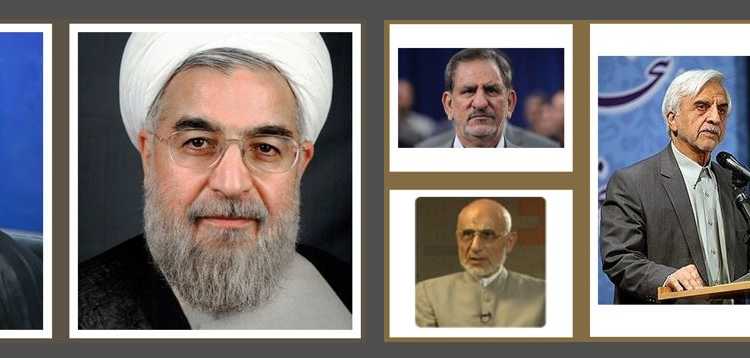Elections are like festive seasons in any democratic country. After every four or five-year people elect their representatives to resolve their problems whatever they may be whether poverty, unemployment, hunger etc. But for some countries elections are a façade with no aim of upholding democratic values. Take for example DPRK (Democratic People’s republic of North Korea) where there is a just a single candidate and people have to vote him because they have no other choice.
Isn’t it funny, then why hold elections in first place? Just save the time and money invested in the mockery of democracy. Well, most of the autocratic states in the world which impose their will upon their citizens in the name of democracy are Islamic countries. Pakistan has elections but they are futile attempts to put sand in the eye because whoever is elected the real power vests with the Pakistani Army which calls the shots and the Prime Minister has to dance to its tunes.
Iran has national presidential election on May 19. Despite being a theocratic state the election theatrics in this Middle-East nation is far more interesting than that of Pakistan or North Korea. The notion of “Supreme Leader” is not only restricted to North Korea, Iran also has one.
It is the Supreme Leader (Ayatollah) who exerts all effective executive power and all candidates must be approved by the Guardian council. In Iran, it does not matter who the President is because he is the second-highest ranking official and over him is the Supreme Leader who has the final say in all affairs whether global or internal. The President’s powers are limited by the authority of the Supreme Leader. However vague it may sound but the President does not control Iran’s armed forces, and make decisions on security, defense, and key foreign-policy issues. The Iranian President has authority over implementation and administration of affairs, but he can be overruled by the Judiciary or the Islamic Revolutionary Guards Corps (IRGC). The presidential candidates are required by law to exhibit “heart-felt and practical allegiance” to absolute clerical rule as a prerequisite for their candidacy. The allegiance of the candidates is evaluated by the Guardian Council consisting of six clerics who are installed by the Supreme Leader. Also, a panel of six members of judiciary is appointed by the Supreme Leader indirectly through the Head of Judiciary.
While there are as many as six men in contention, the two main contenders for the presidential post are Hassan Rouhani, the incumbent president and Ebrahim Raisi. The other four being Mohammad Bagher Ghalibaf, Eshagh Jahangiri, Mostafa Mirsalim and Mostafa Hashemitaba.
Ebrahim Raisi is the custodian of Iran’s wealthiest charityHaving charge of such vast amount of wealth there is little doubt that Raisi enjoys Supreme Leader Ayatollah Khomeini’s full trust. Both candidates have the same ideological bent and are committed to principle to Velayat-e faqih which means the rule of the ayatollahs.
Ebrahim Raiai
In February 2017, Raisi was named as one of the Popular Front of Islamic Revolution Forces (JAMNA)’s presidential candidates whose candidacy is also supported by the Front of Islamic Revolution Stability. The past of Rairai is shrouded with controversies. He was a low-level cleric who climbed up the ladder just for his obeisance to the late Khomeini. In 1988, he had a pivotal role in slaughtering 30,000 political prisoners; most of them were mainly members of the Iranian opposition People’s Mujahidin Organizations of Iran (PMOI). A coterie (Death Commission) was formed for carrying out vendetta against citizens who defied the authority of the Supreme Leader.
It was a four-member body with the sole task of extermination of dissidents of Sharia law. Khomeini had issued a fatwa which ordered the commission to kill the political prisoners or citizens without any chance of fair trial. When Ayatollah Hossein-Ali Montazeri (Khomeini’s handpicked successor) raised voice against the indiscriminate killings he was sacked. The massacre of political prisoners is not the only blot on Raisi’s career but its shade is much darker than any other spot and it overrides everything. In other words, Ebrahim has blood on his hands which can’t be washed away even if he wins the election.
Hasan Rouhani
Rouhani who played important role in finalizing the nuclear deal with the western nations is not far behind Raisi when it comes to executions. The justice minister Mostafa Pour-Mohammadi in his cabinet is none other than another member of the same notorious Death Commission. The rate of executions during Rouhani’s presidency has been unprecedented in past 25 years in Iran as around 3000 executions were carried out. According to Rouhani simply the executions were carried out according to God’s laws and there is nothing wrong with them. Hasan Rouhani was at the helm when the student uprising was crushed in 1999.Iran that carried out 55 percent of all executions worldwide has one of the worst human rights record along with China and Saudi Arabia. Rouhani has always enjoyed decision making power since the Shah was overthrown and Islamic Republic was established. He also enjoys the close confidence of the Supreme Leader.
With the worsening of Iran-American relations and the threat to the nuclear deal the new president whoever is chosen would have the challenge to restore the normalcy and reduce the confrontation with the western nations primarily USA. It is also well known that Iran supports Hezbollah which is a terrorist organization involved in terror attacks on Israel. The hatred of Iran towards the Jewish state is so deep that it wants to annihilate Israel from the face of earth. The Iran is also engaged indirectly in Yemen and Syrian war through its proxies. One thing it has to understand that playing the victim card won’t do any good. It has to stop terrorism and give civil rights to its citizens. When the ordinary Iranian citizen (men and women) will be empowered then only equality will prevail in Middle-East and the world would move one step closer to peace.

























